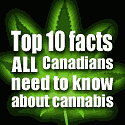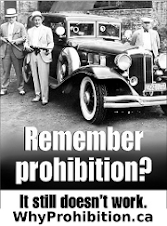The comment I left after the article:
Mental health fears over cannabis may be ‘misguided’
From: International Researchers Reveal Medical Cannabis Breakthroughs!
Excerpts from:
International Association for Cannabis as Medicine
IACM 5th Conference on Cannabinoids in Medicine
2-3 October 2009, Cologne
Program and Abstracts Copyright by
International Association for Cannabis as Medicine
Am Mildenweg 659602 Rüthen Germany
www.cannabis-med.org
METABOLIC ABNORMALITIES, ABNORMAL STRESS RESPONSE AND CHRONIC
INFLAMMATION IN SCHIZOPHRENIA – POTENTIAL TARGETS FOR
CANNABINOID MEDICINES?
In recent years much concern has arisen over the possibility that cannabis smoking in adolescence may be a risk factor for schizophrenia in adult life, although this remains a controversial issue. In contrast, considerable interest in the potential role of the non-psychoactive naturally occurring cannabinoid cannabidiol (CBD) as an anti-psychotic medicine has also developed. The anti-inflammatory and immunomodulatory effects of both THC and CBD are well established. A systematic literature review has suggested the intriguing possibility that habitual cannabis use may protect cognitive function in schizophrenia patients, and CBD has been shown to improve a marker of this in healthy subjects.
There are preliminary data to suggest that cannabinoids may have beneficial effects on abnormal stress reaction, metabolic dysfunction and dyslipidaemia. Since the mechanism of action for the anti-psychotic effects of CBD and other cannabinoids almost certainly differs from all existing agents, synergistic combinations withboth typical and atypical antipsychotics are a possibility. Taken overall, these observations lead to the hypothesis that an appropriately formulated medicine containing a combination of selected cannabinoids may have the potential to target all the major components of the schizophrenia syndrome and thereby significantly reduce the need for polypharmacy. (Read More: http://maryjanecannabian.blogspot.com/2009/10/international-researchers-reveal.html)
In Layman's terms, Cannabis can help the symptoms of schizophrenia and cuts down the number of prescription drugs a person has to take.
As much as politicians love to use the "Tough on Crime/War On Drugs" platform because it resonates with the sheeple, the unmistakable reality is that drug policy will only be its most successful if we let those experts most knowledgeable about drugs guide our drug policy. Science, along with addressing the root causes of addiction (such as poverty, mental illnesses, lack of education and health services and being a victim of sexual abuse) are the pillars of successful solutions to reduce drug abuse (because all users are not abusers, we don't call people alcoholics because they like to have a few beers on a Friday night) and the crime that results from prohibition.
Illegality automatically inflates prices for drugs which of course attracts organized crime and causes violence in a black market. We learned this valuable lesson during the prohibition of alcohol. Prohibition will never be the answer. Taking drugs is a personal decision and people will use them regardless of law. Most people regulate their behavior due to personal belief, we don't steal or murder not because it is against the law, but because we personally think its wrong. If drugs were legal it would be the same, those who want to experiment will, and those who don't, won't. Regulation will also make it harder for kids to get because proof of age will be required to buy - news flash parents - drug dealers don't ask your kids for ID!
And just imagine, all those police officers that must waste their time, energy and resources chasing down plants will now be able to focus on preventing and solving violent crime. Taxpayers should also be happy to know that it costs less for rehab programs than it does to maintain overflowing prisons. And people who beat addiction will contribute to the economy through employment, whereas released convicts can't get a job easily with a criminal record leading to increasing rates of recidivism.
Thank You, Professor Nutt, for being brave and speaking the truth, you are right, the people are on your side and support you. We need science and compassion based drug policy and governments around the world must put their ideology aside and recognize that prohibition is unrealistic and harms society more than actual drugs ever could. Education and regulation is the key.
Update ~ CBC aired a "
Let's Scare the Bejeezus out of Parents"" documentary about "super strong pot" and schizophrenia. Here's my response as well as additional valuable info:
I went right to the RCMP website to find that THC content really isn't as high, pardon the pun, as many people would like us to believe. According to the RCMP the the average levels of THC in cannabis grown in Canada is 9.96-10.25 per cent. (2005/06) I also read the 4 studies that were used as evidence for the documentary. The recurring theme in all research was that they were not all "Cannabis only users" - many people also used amphetamines, alcohol, nicotine, etc. and many had a predetermined genetic link to schizophrenia (psychosis liability) a history of childhood trauma and/or other environmental factors.
What I honest to goodness took away from these studies is that the cannabis/schizophrenia link is the genetic predisposition and the subjects were going to possibly develop schizophrenia regardless of cannabis use. While some surmise that cannabis may trigger symptoms of schizophrenia I conclude that if anything what this proves is that if we regulate the sale to
adults like we do for alcohol then less young people would have access to it at too early an age, thus delaying a possible eventual onset of schizophrenia.
THC-content in Dutch Cannabis. (aka the "Killer Dutch Bud" Frenzy...)
One of the latest prohibitionist scare tactics is to claim that the THC of Cannabis has increased 10 to 30 times. Some people, (including Australian parliamentarians) were even claiming Cannabis now had 45% THC!! The sub text of this was a desperate appeal to baby-boomer parents who may themselves have smoked Cannabis: "Cannabis isn't the harmless old drug you may have smoked in the sixties at university, oh no, its now mutated into an evil-killer- insanity causing drug that turns good kids bad, splits families and ruins lives... etc, etc".
Into the middle of this debate comes the cold hard light of day... at last.
The following communication was originally posted to the ADCA Update list on Wed, 5 Jul 2000.
Dear reader,
There has been a lot of anecdotal information about the THC-content in Dutch Cannabis products sold in coffee shops. A colleague of mine at the Netherlands Institute of Mental Health and Addiction, Dr Raymond Niessink (the renown alcohol and drugs toxicologist and writer of the book 'Drugs of Abuse and Addiction: Neurobehavioural Toxicology') just finished a study about the THC-content in cannabis products sold in Dutch coffee shops.
This is the abstract of his study:
"The policy on cannabis use in The Netherlands is substantially different from that in many other countries. It is based on the idea that separating the markets for hard drugs and soft drugs prevents soft drug users to resort to hard drug use. Over the years so-called coffee shops emerged. Coffee shops are alcohol free establishments where the selling and using of soft drugs is not prosecuted, provided certain conditions are met. Many of the cannabis products sold in these coffee shops originate from Dutch-grown grass called nederwiet.
A number of critics of the Dutch drug policy have recently claimed that the THC content of nederwiet has increased between 10 and 30 times over the last decade. However, the THC content of cannabis products as sold in coffee shops has not systematically been tested. On request of the Ministries of Health and Justice, the potency of cannabis products as sold in coffee shops in The Netherlands was investigated.
The aim of this study was to investigate the concentration of D9-tetrahydrocannabinol (THC) in marihuana and hash as sold in Dutch coffee shops. In addition we wanted to know whether there are differences between the cannabis products originating from Dutch grown hemp (nederwiet) and those derived from foreign hemp. The names and addresses of 50 coffee shops were randomly selected from a list of 845 Dutch coffee shops. For the purpose of this study, 126 samples of nederwiet, 56 samples of foreign marihuana, 18 samples of Dutch hash and 90 samples of hash prepared from foreign hemp were anonymously bought in the selected coffee shops. As a rule samples of 1 gram were bought.
The average THC content of the marihuana samples was 7,5% and that of the hash-samples 12,6%. The average THC content of nederwiet (8,6%) was significantly higher than that of foreign marihuana (5,0%). Hash derived from Dutch hemp contained more THC (20,7%) than hash originating from foreign hemp (11,0%). These THC percentages do not deviate much from the percentages that have been reported by the Dutch Forensic Institute in the middle of the nineties about confiscated marihuana and hash samples.
The prices that had to be paid for nederwiet and Dutch hash were higher than the prices for foreign marihuana and hash. The price for nederwiet in Amsterdam was higher than in the rest of the country. There is a significant correlation between price and THC content of the cannabis products. When the THC concentrations in nederwiet are compared with the THC concentrations in marihuana from foreign studies we must conclude that the concentrations in nederwiet are nothing out of the way.
The THC-content of nederwiet is comparable with the THC content of sinsemilla samples as measured in the US between 1980 and 1997.
Continuation of the systematic collection of data on the THC content of samples of cannabis consumed by regular users should have a high priority. Apart from that, it is necessary to have factual information about the relation between high THC content of cannabis products and the actual body-burden as well as scientific information on acute and chronic toxicity from regular high THC-blood concentrations."
From: Jaap Toet
Trimbos-institute (Netherlands Institute for Mental Health and Addiction)
Dept. of Monitoring and Epidemiology Postbus 725 3500 AS Utrecht The Netherlands
And from Essays & Articles, Dr. John Jiggens
This study shows that incidence of schizophrenia has not increased with increased numbers of Cannabis users:
"The evidence that schizophrenia levels have remained constant is overwhelming, not just in Australia, but right throughout the world.
People Living with Psychotic Illness: An Australian Study 1997-98, published as part of the National Survey of Mental Health and Wellbeing, found that the prevalence for schizophrenia and schizoaffective disorders in urban Australia was about 3 per 1000 in 1998. This was in the middle range of a world-wide prevalence of 2 to 5 per 1000.
The report commented:
"Epidemiological studies estimating the prevalence of schizophrenic and related psychotic disorders have been conducted since the early decade of this century [i.e.Twentieth Century]. The results of studies carried out at different times and different parts of the world ... suggest that, notwithstanding cultural and biological differences between populations, and the different methods used to ascertain morbidity, the prevalence of schizophrenia is remarkably similar around the world (in the range between 2 and 5 per 1000 according to the majority of studies) and stable over time."
This conclusion—that schizophrenia levels have been stable over place and time for as long as they have been measured—was based on an examination of 28 surveys into the incidence of schizophrenia conducted throughout the world over several decades. One of these surveys was a 1993 World Health Organisation study on the incidence of schizophrenia in which standardised methods of case detection, interviewing and diagnosis were applied simultaneously in 7 countries. Like the other surveys, this found little variation in the incidence rates of schizophrenia across the different populations and cultures.
Countries which had extremely high cannabis use (Jamaica in 1995] had the same schizophrenia rates per 1000 as countries with zero cannabis use (Norway in 1926-1935).
Q: Does cannabis use cause schizophrenia?
A: No. Over the past four decades most countries in the Western world have experienced rapidly increasing cannabis use. None of these countries has experienced any accompanying “Madness” plague. Countries like Australia and Jamaica which have the highest levels of cannabis use have levels of schizophrenia similar to the rest of the world.
We’ve smoked the “Reefer” for four decades, and “Madness” levels have remained steady, not just in Australia, but all over the world. Where does that leave the “Reefer Madness” theory?? --- http://drjiggens.com/does_cannabis_use_cause_schizophrenia.html ~
*****
Along with Science, let's just throw in "Life" too.
While I know
Anslinger's "Marijuana drives you insane!" arguement will more than likely continue on as it's literally been embedded into the minds of multiple generations now, I'll leave you with this: I believe correlation does not mean causation. Just because some people may not handle Cannabis well does not mean everyone should be punished for using it. In comparison with all things we ingest it's totally understandable that Cannabis isn't for everyone and perhaps those with a genetic predispostion for Schizophrenia should not induldge. Just like diabetics shouldn't dive into the dessert bar at a buffet, or maybe the children of alcoholics should avoid booze. Heck, people with balance problems probably shouldn't attempt gymnastics either. We must apply common sense.
So many things in life come down to people making personal decisions for themselves. We don't always make the best choices, but such is life, and each experience - great or small, right or wrong, happy or sad - shapes the person we become. Everyone has regrets and can question their actions (did I really wear that top to that party back in grade 11? What was I thinking?!) and
hindsight is 20/20. But that is the beauty of life, it's a journey, sometimes it's bumpy and sometimes it's smooth sailing and in the end each of us owns the road we've traveled down. There are different views of "
The Meaning of Life", and no two people have the exact same philosophies and I think that's wonderful, otherwise this would be one really boring existence. What would be the point of a life with no individuality and no
personal autonomy? The geek in me rejoices that we are not living in Hives of "The *Borg" - I subscribe to a more
"Browncoat/Independent/Resist The *Alliance" way o' life.
"The road of life twists and turns and no two directions are ever the same. Yet our lessons come from the journey, not the destination." ~ Don Williams, Jr
*The Borg is a collective, meaning that they—or it—possess a single mind. That Borg mind has the single intent of “assimilating” all organic species into the collective. The Borg are utterly without mercy or compassion. In a collective society only the needs of the group as a whole are considered, and in this utilitarian calculation the needs of the unrivaled number of Borg will nearly always override any other considerations.
*The Alliance (from
Firefly/Serenity)
A scene at an Alliance school, where a teacher sadly muses that it's hard to understand why the benighted Independents, the secessionists, have resisted the attempt to bring them the gifts of civilization. River Tam speaks the truth:
"
We meddle... People don't like to be meddled with. We tell them what to do, what to think, don't run, don't walk. We're in their homes and in their heads, and we haven't the right. We're meddlesome."
Update August 2012
Cannabis Is Least Harmful Substance in Published British Medical Journal ‘Harm To Self And Others’ Study.
The British Medical Journal on 27th of July 2012 published an extensive study scaling the harm caused to ones self and to others due to substance use. The study looked at the 19 most commonly used drugs both legal and illicit. Heroin was ranked at number 1 whilst Alcohol sat in 4th place and cannabis came bottom being deemed least harmful in all 3 tables.
The Paper titled “
Quantifying the RR of harm to self and others from substance misuse: results from a survey of clinical experts across Scotland.” published in the BMJ by a collective of 6 research bodies, five from the UK and one from our common wealth cousins in New Zealand who also operate under a policy of prohibition like ours – The Misuse of Drugs Act. This study was carried out by 292 clinical experts. -
BREAKING NEWS! (That we already knew) The Therapeutic Potential of Cannabis and Cannabinoids
NORML reports as well: “There Is Now Clear Evidence That Cannabinoids Are Useful For The Treatment Of Various Medical Conditions”
"According to a just published
review in the German scientific journal
Deutsches Ärzteblatt International, scientific findings from over 100 controlled clinical trials involving either cannabis or its constituents provide “clear evidence that cannabinoids are useful for the treatment of various medical conditions.”
Investigators from the nova-Institute and the Hannover Medical School in Germany reviewed over 100 controlled trials assessing the safety and efficacy of cannabis and cannabinoids.
Researchers reported: “Knowledge about the therapeutic potential of cannabis products has been greatly improved by a large number of clinical trials in recent years. …
There is now clear evidence that cannabinoids are useful for the treatment of various medical conditions,” including chronic neuropathy (nerve pain), multiple sclerosis, HIV/AIDS, Gilles de la Tourette syndrome, and other indications."
And more from the awesome Professor David Nutt mentioned above:
David Nutt's Blog: Evidence not Exaggeration
Smoke without fire? Scaremongering by the British Lung Foundation over cannabis vs tobacco
June 11, 2012
Hypothesising an alternative: Applying the scientific process to drug policy June 29, 2012
From The Economist:
Reefer madness Plain speaking on a highly coloured issue
David Nutt Says Legalising Cannabis Would Curb Alcohol Use 'By A Quarter'
Alcohol - not marijuana - is the gateway drug, study shows














